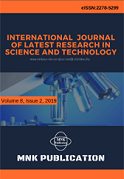DOI:10.29111/ijlrst ISRA Impact Factor:3.35
Research Paper Open Access
International Journal of Latest Research in Science and Technology Vol.4 Issue 2, pp 11-15,Year 2015
Correspondence should be addressed to :
Received : 01 April 2015; Accepted : 08 April 2015 ; Published : 30 April 2015

| Download | 126 |
|---|---|
| View | 180 |
| Article No. | 10482 |
The concepts of nanotechnology were initiated and first discussed in 1959 by renowned physicist Richard Feynman. Nanotechnology has then become a new wave of technology which is speculated to replace most of current technology. It is due to nanotechnology new products for future lifestyle with high efficiency, high speed and environmental friendly services. Market researchers are predicting the world market volume of nano-optimised products to be up to 3 trillion US Dollars in 2020. This would correspond to about 15 percent of the entire global production of goods. Even though nanotechnology offers many benefits to the future technology, it may lead to few social issues which are still under debate especially about the safety, environment, health and misuse. In order to establish nanotechnology awareness and acceptance, the assessment from the society is an important factor to be discussed. In this paper, a feedback on nanotechnology from a group of undergraduate business students in Universiti Teknologi MARA is presented. The level of awareness has been divided into five categories which are no feeling, alarmed, concerned, hopeful and exited. The highest percentage of frequency of awareness is in the concerned level, by which possible side effects and usage safety are the critical issues raised. In addition, the analyses capture the characteristics which potential consumers of nanotechnology products based feel very important. Based on the awareness and perceived usefulness score, Model of Nanotechnology Acceptance for nanotechnology research and initiatives is proposed. The model would serve as a foundation for determining the best approach of creating better awareness and offering nanotechnology products without violating the sustainability requirements of the environment, society and economy.
Copyright © 2015 Ramita Abdul Rahim et al. This is an open access article distributed under the Creative Commons Attribution 4.0 International (CC BY 4.0) license which permits unrestricted use, distribution, and reproduction in any medium, provided the original work is properly cited.
Ramita Abdul Rahim,Erne Suzila Kassim,Hazniriah Mohd Azizli, Nor Afni Md Sari,Saifollah Abdullah , " Nanotechnology Acceptance: A Case Study Of University Students In Malaysia ", International Journal of Latest Research in Science and Technology . Vol. 4, Issue 2, pp 11-15 , 2015

MNK Publication was founded in 2012 to upholder revolutionary ideas that would advance the research and practice of business and management. Today, we comply with to advance fresh thinking in latest scientific fields where we think we can make a real difference and growth now also including medical and social care, education,management and engineering.

We offers several opportunities for partnership and tie-up with individual, corporate and organizational level. We are working on the open access platform. Editors, authors, readers, librarians and conference organizer can work together. We are giving open opportunities to all. Our team is always willing to work and collaborate to promote open access publication.

Our Journals provide one of the strongest International open access platform for research communities. Our conference proceeding services provide conference organizers a privileged platform for publishing extended conference papers as journal publications. It is deliberated to disseminate scientific research and to establish long term International collaborations and partnerships with academic communities and conference organizers.